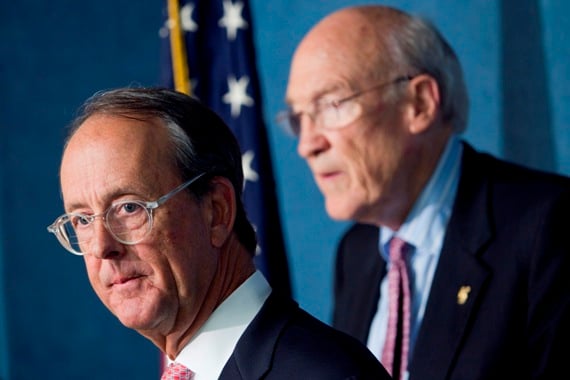Tells Schwab crowd risks include recession, rising unemployment
When Erskine Bowles was asked by President Barack Obama to co-head a committee tasked with finding a way to reduce the country's debt, he thought he would be fighting for his grandchildren.
As he looked at the numbers, however, he realized that it wasn't the future that is at risk from the United States' ever-growing debt problem; it is the present.
“What we face is the most devastating financial disaster in history,” he said at Charles Schwab & Co. Inc.'s Impact 2012 conference in Chicago.
“It also happens to be the most avoidable financial disaster in history,” Mr. Bowles, co-chairman of the National Commission on Fiscal Responsibility and Reform, along with Alan Simpson.
“If we don't get politicians on the left and the right to put politics aside and pull together rather than push apart, we are heading down a pretty destructive path,” he said.
Just how destructive would it be?
“If we do nothing and we breach this fiscal cliff, we go back into recession,” Mr. Bowles said. “Growth will slow by 3%; we're only growing at 1%. Unemployment will go back to 9%. It's crazy. While the rest of the country has been having a fragile recovery, all Washington's been having is an election. They've done nothing.”
The plan Mr. Bowles and Mr. Simpson, a former Republican senator from Wyoming, conceived in 2010 to lower the debt has come back into focus with the reelection of Mr. Obama.
“This thing has risen from the dead like Lazarus,” Mr. Simpson said.
Their plan calls for a combination of increased revenue, through tax reform, and Social Security and health care reform.
Mr. Bowles conceded that the solution won't be easy. Social Security reform, for example, is a particularly tough sell to the public and to politicians focused on getting re-elected.
“We need to make the hard choices, the politically difficult ones,” he said. “If we put our house together, we can compete with anyone, but if we don't, we are heading down the path of becoming a second-rate power.”







